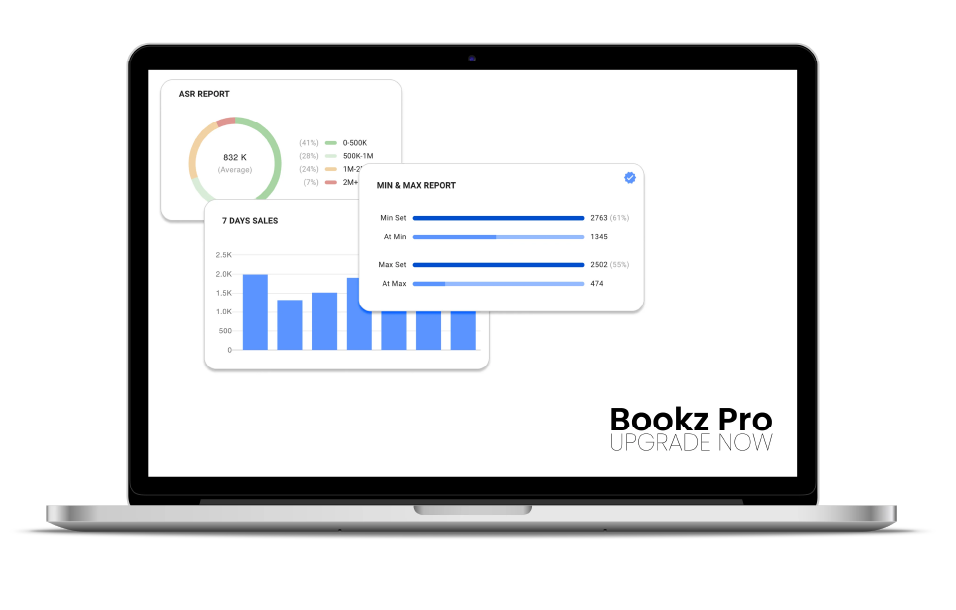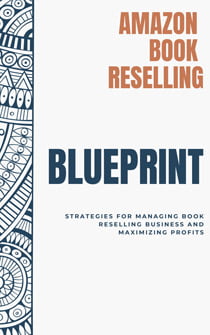How to Get Ungated on Amazon: 5 Proven Methods For Book Sellers

Amazon’s gated categories contain some of the most profitable opportunities for sellers—yet many remain locked out. While restrictions might seem like roadblocks, they’re competitive moats that protect sellers who know how to navigate them.
Book resellers and FBA/FBM sellers often watch lucrative textbooks, collectibles, and specialty items slip away—resulting in fewer inventory options and missed revenue.
This guide reveals five proven methods to get ungated on Amazon, helping you unlock profitable categories while maintaining compliance and protecting your seller account.
Amazon's Book Restrictions
Amazon has locked away some of the most profitable book categories behind approval gates. While you’re competing with thousands of sellers over $3 paperbacks, restricted categories hold textbooks selling for $200+, rare collectibles commanding premium prices, and specialized academic titles with minimal competition.
The frustrating part? Many book sellers never attempt ungating, assuming it’s too complicated or risky. The next section shows you exactly how to break through those barriers safely and systematically.
What Does "Ungated" Mean on Amazon?
Getting “ungated” means gaining approval to sell in Amazon’s restricted categories. These categories require special permission before you can list products.
Amazon didn’t create these restrictions to frustrate sellers—they serve three important purposes:
- Quality control: Amazon wants to make sure customers get authentic products, not knockoffs that fall apart or potentially dangerous items. Think about it—would you want to buy a “textbook” that’s actually a poorly printed copy with missing pages?
- Brand protection: Publishers and manufacturers need protection from counterfeit goods flooding the marketplace. When fake products damage a brand’s reputation, legitimate sellers suffer too.
- Regulatory compliance: Some products have legal requirements. Selling restricted items without proper authorization can create liability issues for both Amazon and sellers.
While Amazon restricts many categories, book sellers mainly encounter gates in:
- College textbooks and educational materials
- Rare and collectible books
- Certain publisher-specific titles
- Professional and academic publications
Other common restricted areas include health products, automotive parts, jewelry, and beauty items—but as a book seller, your focus should be on breaking through those lucrative textbook and collectible barriers.
What "Ungated" Actually Means for Book Sellers
Getting ungated means Amazon grants you permission to sell in restricted book categories. These aren’t random limitations—Amazon restricts categories to:
- Prevent counterfeit textbooks and academic materials
- Protect publishers from unauthorized sellers
- Ensure collectible books meet authenticity standards
- Maintain quality in professional and educational markets
Why Getting Ungated Matters for Your Business?
- Higher Profit Margins: Textbooks routinely sell for 10-20x the price of regular books. A single calculus textbook can generate more profit than dozens of mass-market paperbacks.
- Less Competition: While thousands compete over popular fiction, fewer sellers can access restricted educational and collectible markets. This means better pricing power and fewer race-to-the-bottom scenarios.
- Predictable Demand: Academic books follow semester cycles. Textbooks for fall classes spike in August, creating predictable income opportunities that savvy sellers capitalize on year after year.
- Access to High-Value Inventory: Library sales, university buybacks, and estate sales often contain valuable restricted books that only ungated sellers can flip profitably.

5 Proven Methods to Get Ungated on Amazon
1. Provide Invoices from Reputable Suppliers
This remains the most reliable ungating method.
What Amazon accepts:
- Invoices from major book distributors
- Publisher invoices
- University bookstore receipts (for smaller quantities)
- Library supplier documentation
Invoice requirements:
- Your business name and address
- At least 10 units purchased
- Dated within 180 days
- Clear supplier contact information
- Official letterhead or business formatting
Pro tip: Build relationships with textbook buyers at local colleges. They often have excess inventory and can provide proper documentation for legitimate purchases.
2. Build Strong Seller Credibility
Amazon reviews your overall account health when considering ungating applications.
Focus on these metrics (numbers are an estimate):
- Order Defect Rate: Under 0.75% (lower than the general requirement)
- Late Shipment Rate: Under 2%
- Cancellation Rate: Under 1.5%
- Customer feedback: Above 96%
- At least 90 days of consistent performance
Maintain these standards consistently for at least 90 days before applying for category approval.
Book-specific considerations:
- Accurate condition descriptions (crucial for textbook buyers)
- Fast shipping (students need books quickly)
- Responsive customer service
- Proper handling of returns and exchanges
3. Apply Directly Through Seller Central
Don’t just randomly click “Request Approval.” Follow this sequence:
- Research specific ISBN or ASIN you want to sell
- Verify it’s actually restricted (not just out of stock)
- Gather ALL required documentation first
- Navigate: Inventory → Add a Product → Search restricted item
- Click “Request Approval” only when fully prepared
- Submit a complete application with supporting documents
Common mistake: Applying for broad categories instead of specific products. Start with individual ASINs you have documentation for.
4. Start with Lower-Barrier Book Categories
Some book restrictions are easier to overcome than others. Build credibility progressively:
Start with these friendlier categories first:
- General study guides and educational workbooks
- SAT, GRE, and other test prep materials from well-known publishers
- Business and self-help books aimed at professionals
- University press books (often easier than commercial textbooks)
Harder categories (attempt after initial success):
- Brand-new textbooks (the $300+ monsters students need each semester)
- Rare first editions and signed copies worth serious money
- Limited print runs and special collector editions
- Titles from publishers who guard their products like Fort Knox
All in One Software
for Book Sellers
Scout Better – List Faster – Reprice Smarter
Over 30% Business Growth
Achieved by Our Clients

5. Consider Professional Services (With Extreme Caution)
The book-selling community has mixed experiences with ungating services. Some legitimate providers exist, but risks are substantial.
Potential benefits:
- Established relationships with book distributors
- Knowledge of category-specific requirements
- Time savings on paperwork
Serious risks:
- Account suspension for fraudulent documentation
- High costs ($500-2000+ with no guarantees)
- Fake invoice schemes that destroy seller accounts
Recommendation: Only work with services that can provide verifiable references from successful book sellers. Never use anyone who suggests fake invoices or “guaranteed” approvals.
Critical Mistakes That Will Get You Denied
Using Fake Documentation
Amazon verifies every invoice. Book distributors are well-known, and fake documentation gets flagged immediately. One fraudulent application can permanently ban you from restricted categories.
Ignoring Book-Specific Requirements
Textbook categories have unique documentation needs different from general retail products. Generic applications that don’t address educational market requirements face automatic denial.
Poor Condition Accuracy
Amazon pays special attention to how book sellers describe the condition. Inaccurate descriptions in your selling history will hurt ungating applications, especially for collectibles.
Applying Too Early
Newer seller accounts face higher scrutiny. Wait until you have at least 6 months of strong performance and 100+ successful book transactions before applying.
How Booksellers Benefit from Ungating?
Book resellers face specific restrictions that limit access to profitable inventory:
- Textbook restrictions prevent access to high-value educational materials with strong seasonal demand.
- Collectible book limitations block rare and vintage books that command premium prices.
- Academic publisher restrictions limit access to specialized professional and academic titles.
Getting ungated in these areas opens access to inventory with:
- Higher average selling prices
- Better profit margins
- More predictable demand cycles
- Less price competition
Stop Missing Out on High-Value Textbooks – Begin Ungating Today

Amazon Book Reselling Blueprint
Read now, explore our full guide. Your revolution starts here. Subscribe to get the blueprint!
Getting ungated is only the beginning. To succeed long-term, you need systems that maintain compliance, protect account health, and maximize profitability. Bookz Pro delivers exactly that with compliance tracking, sourcing tools, performance monitoring, and inventory optimization—all built for serious booksellers.
Start your 14-day free trial of Bookz Pro today and get the Amazon Book Reselling Blueprint—a step-by-step guide to sourcing, listing, and selling profitably in both open and newly ungated categories.
Conclusion
Amazon’s gated categories aren’t barriers—they’re opportunities for sellers who understand the process. By following proven methods and maintaining strong account health, you can unlock profitable categories that others cannot.
The ungating process requires patience, proper documentation, and consistent account management. But for sellers who execute correctly, the revenue potential makes the effort worth it.
Don’t let restrictions limit your business growth. Master the ungating process, access profitable categories, and build systems that let your Amazon business scale.
Frequently Asked Questions
Textbook and educational categories typically take 7-14 business days. Complex applications or peak academic seasons may extend this timeline.
Focus on one category first. Successful textbook approval often opens doors to related educational categories more easily.
Review their specific feedback and address those issues. Most denials stem from insufficient documentation or account health problems that you can fix.
Yes. Keep records of all restricted inventory sources. Amazon may request documentation during routine reviews or customer complaints.
Major distributors like Ingram, Baker & Taylor, and direct publisher invoices carry the most weight. Smaller regional distributors may require additional verification.



